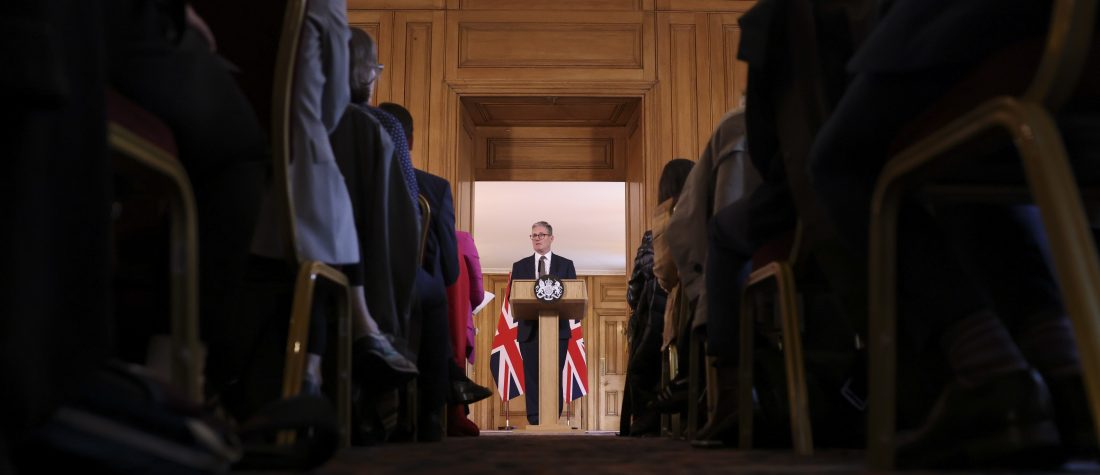In the corridors of power at Number 10, a shakeup is underway. The appointment of Morgan McSweeney as Downing Street Chief of Staff and James Lyon as director of strategic communications suggests a decisive shift in the way Prime Minister Keir Starmer is preparing to govern. With the departure of Sue Gray, Starmer appears to be opting for a strategy grounded more in media management and public relations. But what the Prime Minister must recognise is that his government should be driven by impactful policy, not headlines.
For many, Sue Gray’s exit is as telling as McSweeney’s and Lyon’s arrivals. Gray was a key figure in Starmer’s team, developing a reputation for “micromanaging personnel”. For Labour MPs and insiders who viewed her as a stabilising force, her removal indicates more than a change in faces; rather, it signals a shift in governing style and a deeper transformation in priorities, one that appears to place communication strategy and electoral image-making above policy substance.
At the heart of this transformation is McSweeney, the man who spearheaded Labour’s General Election campaign earlier this year. Traditionally, individuals in McSweeney’s position have been policy strategists or experienced civil servants, with election gurus being brought in only during times of crisis or looming electoral battles. The most notable example is Isaac Levido, who was summoned to help steer communications during the COVID-19 pandemic under Dominic Cummings’ de facto reign as Chief of Staff.
Starmer’s decision to put McSweeney at the centre of his government indicates a desire to maintain a people-pleasing mindset. This perspective is reinforced by the appointment of James Lyon, whose most recent work was with TikTok as Head of Corporate and Policy Communications in Europe. Lyon’s background – working at the intersection of technology and communication – brings to mind a figure like Alastair Campbell, who was instrumental in shaping Tony Blair’s “New Labour” narrative. The problem, however, is that while Campbell was influential, Blair’s era was also defined by substantive policy changes that transformed the UK in impactful ways. Starmer, on the other hand, risks becoming all spin and no substance.
The reality is that Starmer has already suffered from a lack of communication expertise. His administration has struggled to control the narrative on several key issues. The recent decision to cut the Winter Fuel Allowance, for instance, became a flashpoint for criticism across the political system. His acceptance of freebie donations has cast shade on the Labour government, with the majority of Britons believing it is “sleazy”. Time and again, Starmer’s ministry takes one step forward and two steps back.
Yet, the answer to these communication failures is not to double down on spin and PR tactics. What Starmer truly needs is not a media-savvy team that can make bad news look good, but a policy-driven government that can deliver real, tangible improvements to people’s lives. The public will not be fooled by slick messaging if it is not accompanied by meaningful change.
While spin may help a government weather a few storms, it cannot be the foundation of long-term success.
Take, for instance, the issue of government spending. Reducing wasteful spending and redirecting funds toward critical national services would make a genuine difference to the British economy. It was earlier this year that Wes Streeting was criticising the NHS for wasting roughly £10 billion per year, and now the Health Minister is scared to make the necessary decisions to reduce this wasted spending.
Cutting unnecessary bureaucracy, streamlining public services, and investing in infrastructure would not only improve efficiency but also create jobs and encourage economic growth – all things that Labour promised would happen if elected.
Policies like this would demonstrate a commitment to improving the lives of ordinary Britons, rather than merely managing the political optics. The challenge for Starmer is to lead with such a vision – to put forward policies that address the root causes of the UK’s economic and social issues, rather than focusing on how those issues are perceived by the public and the press.
The appointments of McSweeney and Lyon may help Starmer and his government avoid some of the pitfalls that have tripped them up in the past. But if their efforts are focused solely on spinning a better story, they risk being taken hostage by the headlines. What the UK needs now is not better storytelling, but better governance – leadership that is focused on delivering real solutions to real problems. Starmer must resist the temptation to let spin dominate his administration, and instead prioritise the policy-driven change that voters so desperately want.
In the end, successful governments are not remembered for their ability to manage crises or communicate effectively. They are remembered for the changes they brought about, for the policies that made people’s lives better. If Starmer hopes to leave a lasting legacy, he will need to ensure that his government is defined by more than just the faces at the front of it.
Oliver Dean is a political commentator with Young Voices UK. He studies History and Politics at the London School of Economics and Political Science (LSE) where he is the Treasurer of the LSE Hayek Society.


